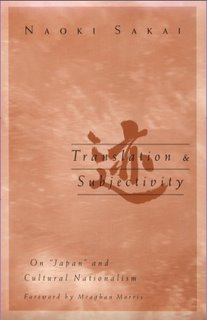The "Noh Mask Effect"
I found this web page showing an effective moving three-dimensional graphic of the noh mask effect - the capability of a fixed mask representing different emotions in the control of a skilled actor.
A class blog for students of English 380 - "Literature in Translation" - at Simon Fraser University in Autumn 2005.
I found this web page showing an effective moving three-dimensional graphic of the noh mask effect - the capability of a fixed mask representing different emotions in the control of a skilled actor.
The course thesis that civilisations each have their unique identity -- essentially, a set of assumptions, virtues and traditions -- which is accepted unconsciously by its members and is absolutely untranslatable, receives incidental support from a CNN article, here, treating the aftermath of the recent Al Qaeda bombings of hotels in Jordan.
Family members of Jordanian-born al Qaeda in Iraq chief Abu Musab al-Zarqawi have renounced the terror leader, telling King Abdullah II on Sunday that they would "sever links with him until doomsday."Setting aside here any matters of content relative to Islamic terrorism, the relevant point for our course is the reason why al-Zarqawi has been cut off by his tribal family now and not for any of his previous acts of terror. In a phrase, al-Zarqawi has in this case violated a value fundamental to the identity of the wider tribal culture whichto which he belongs by birth. The article gives a specific quotation from his family group which states the violation in its own cultural terms:
"A Jordanian doesn't stab himself with his own spear," they wrote. "We sever links with him until doomsday."
Regarding the motion picture that Tina linked us to as part of her presentation on geisha, one review after its recent release is headlined "Geisha' loses Japanese nuances on big screen" -- which, after our current course, we could have predicted ....
We'll use this post as a place to broadcast our class' group blog URLs. Now that everyone is confident about what they are doing, no-one will mind others scoping their blog.
I remember saying in the hurly-burly of Thursday's seminar discussion that I would blog a couple of passing points. I cannot, alas, bring to mind what they were. Can any one of you recall?
In our second hour this coming Tuesday we will move to the Assignment Lab in the W.A.C. Bennett Library, room 2105, for a workshop on your Group Project and on related library research methods. I will be available to answer questions, give advice on blogging, and examine and critique your progress to date.
The term paper, thirty-five hundred words long independent of footnotes, has an open topic based on your literary analysis of any two or more of our required or recommended Course texts. Your collective engagement with the course material is strong and varied and would be emasculated or emammalated by pre-set topics. In order to ensure that your individual topic is strong, concise and workable, everyone must have his or her thesis statement validated by me, in writing, on or before Thursday November 24th at the conclusion of my Office Hours.
An excellent & concise blog entry from EdTechPost detailing "some uses of blogs in education" here. I recommend it highly as an excellent introduction to the ways in which blogging will, to a virtual certainty, become integrated into university practice to the same degree as e-mail, on-line registration, and digitised databases are now.

From AOL News:
TOKYO (Nov. 7) - "Doonesbury" and "Peanuts," make way for "manga." Come January, the Sunday funnies of several major North American newspapers will have doe-eyed women in frilly outfits, effeminate long-haired heroes and other trademark images of the Japanese comic style. The reason? Newspaper editors want to attract more young readers. A study released earlier this year by the Carnegie Corporation put the age of newspaper readers at 53 and climbing - hardly a recipe for circulation growth. More here >>.
Full story here.TOKYO AP Oct 25, 2005 — An advisory panel on Japan's monarchy will propose allowing women to ascend the throne, the chairman said Tuesday, in a boost to a measure that has broad support in Japan and could relieve pressure on the imperial family to produce a male heir.
TOKYO (Reuters) - A cousin of Japan's Emperor Akihito has questioned proposals to allow a woman to ascend the Chrysanthemum Throne, urging that other options such as reviving pre-war princely houses and the practice of royal concubines, should be onsidered first to maintain the male imperial line.
I introduced in lecture Tuesday, regarding the work of our present author Banana Yoshimoto, the nihonjinron group - an intellectual and literary movement which claims that Japanese people and culture are not just unique in relation to the world but "uniquely unique."
But in a nation where outsiders are still regarded with unease, the stream of foreigners invading the most Japanese of sports -- and one whose rituals are strongly tied to the domestic Shinto religion -- has generated both controversy and backlash. Critics contend that the new European stars have longer arms and legs and allege that this gives them an unfair advantage. The huge growth in foreign-born pros led officials in 2002 to impose a limit of only one foreign wrestler per sumo stable. Some stables, all of which are permitted to be owned and operated only by Japanese citizens, maintain private policies barring foreigners.
 Our next guest speaker is scheduled for next Tuesday, November the 8th. Robert Mustard will speak to us on the differences in fundamental assumptions between the anglosphere and Japan, and on the history and spirit of Japan as it is reflected in the uniquely pacifist Japanese martial art Aikido.
Our next guest speaker is scheduled for next Tuesday, November the 8th. Robert Mustard will speak to us on the differences in fundamental assumptions between the anglosphere and Japan, and on the history and spirit of Japan as it is reflected in the uniquely pacifist Japanese martial art Aikido.Last lecture I put strong emphasis on precise speech. One of the greatest challenges to translation, & perhaps the most widely convincing evidence for indeterminacy in translation, is vague or loose speech or writing.
The job of translation is a trial and error process, very similar to what happens in an Oriental bazaar when you are buying a carpet. TheGiven the essential instability of the tokens of exchange in the translation market, the more crucial the integrity of their original minting - i.e. the need to choose the word that most closely matches your specific thought.
merchant asks 100, you offer 10 and after an hour of bargaining you agree on 50.
 Today's lecture built on last Tuesday's introduction to translation theorist Naoki Sakai. Last week detailed the individual problem of the translator's necessarily paradoxical subject status - an addressor but not the addressee's addressor, and an addressee but not the addressor's addressee - which Sakai incorporates into his larger thesis of the fundamental problematic of radical subjectivity in translation. Today, the subjectivity problematic was applied on the larger, national, level. Sakai's theoretics, which have similarities to Michel Foucault insistence that bureaucratic departments create rather than serve systems of knowledge, develop the argument that the nation of Japan and the Japanese ethnos are both constructs of scholars and bureaucrats who initiated projects to translate the set of dialects, languages and cultures clustered on the "Japan" archipelago between China (in the Heian era) and between England and America (in the Meiji era.)
Today's lecture built on last Tuesday's introduction to translation theorist Naoki Sakai. Last week detailed the individual problem of the translator's necessarily paradoxical subject status - an addressor but not the addressee's addressor, and an addressee but not the addressor's addressee - which Sakai incorporates into his larger thesis of the fundamental problematic of radical subjectivity in translation. Today, the subjectivity problematic was applied on the larger, national, level. Sakai's theoretics, which have similarities to Michel Foucault insistence that bureaucratic departments create rather than serve systems of knowledge, develop the argument that the nation of Japan and the Japanese ethnos are both constructs of scholars and bureaucrats who initiated projects to translate the set of dialects, languages and cultures clustered on the "Japan" archipelago between China (in the Heian era) and between England and America (in the Meiji era.)